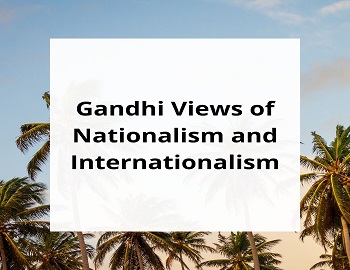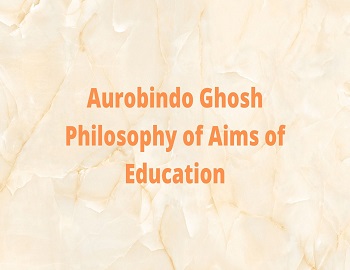Gandhi Views on Nationalism and Internationalism
Gandhi saw a very close link between nationalism and internationalism. His belief was that internationalism could grow only out of true nationalism. Service for one’s nation was not inconsistent with service for the world. One must be a nationalist. One could not serve humanity unless one knew to service his own country. Nationalism was not evil. It was the narrowness, selfishness and exclusiveness which were the curses of the modern nations. It was indeed narrow nationalism that desired self-enrichment at the expense of the other nations. India should follow a path different from that of other nations. Thus Gandhi’s concept of nationalism was not the customary exclusive concept. It was not intended to harm any other nation or individual. He asserted that his patriotism was not an exclusive thing. It was an all-embracing concept. He rejected that nationalism which sought to build on the destruction or the exploitation of other nationalities, as a dangerous phenomenon. His concept of patriotism was worth nothing as it was consistent with the general good of mankind as a whole. Thus right nationalism could not become a danger to other nations and it would not harm any other nation.
He believed that nationalism and internationalism were indeed complementary. True nationalism would never be a hindrance to the service of humanity as a whole. Each nation ought to extend its services to its neighbours because God did not make these frontiers. One country should not think of enjoying its freedom at the expense of other countries. He asserted that people who lived in India should be proud to call themselves the sons and daughters of the same country and who should be entitled to a perfect equality in the eyes of the law of the land. Religion, he pointed out was no test of one’s nationality but a personal matter between man and God. Viewed from the angle of nationality, the people of India are Indians first and Indians last, whatever may be their religious beliefs.
Gandhi’s life and teachings have a universal appeal. He believed in the essential unity of man and the underlying unity of all nations. He did not make any distinction between religions, nations and races. To him, the fundamental problems of the human conditions know no national, racial, religious or ideological frontiers. To him, there was no distinction between one set of human beings and another. Why did then he crusade for Indians alone? “Through the realization of freedom of India, I hope to realize and carry on the mission of the brotherhood of man. We want freedom for our country, but not at the expense of the exploitation of others. I want freedom for my country (BUT) I would not be deserving of that freedom if I did not cherish and treasure the equal right of every other race, weak or strong to that freedom if I did not cherish and treasure the equal right of every other race, weak or strong to that freedom…”. His statement that “in any experience, I have known no distinction between relations and strangers, countrymen and foreigners, whites and coloured, Hindus and Indians of other faiths, whether Musalmans, Parsis, Christians or Jews” was fully warranted by the course of his life which was like an open book.









Comments (No)